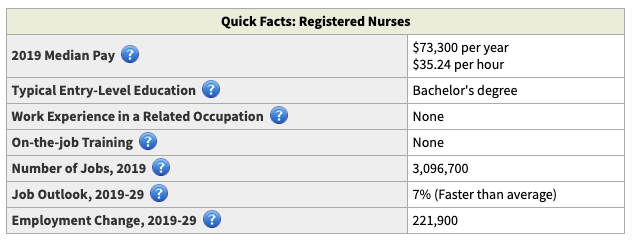Top 6 In-Demand Healthcare Jobs
The healthcare industry is primed for growth.
According to the Bureau of Labor Statistics (BLS), the industry is set to add more than 4 million jobs through 2022. There are going to be many opportunities in healthcare. However, which areas and specializations are going to be most in demand?
Let’s take a look:
1. Registered Nurse
Nurses not only make up the biggest segment of the healthcare industry, but they’re also one of the most critical. According to Nursing World, with over half a million registered nurses set to retire by 2022, the specialization is set to experience a major shortage by 2022. In fact, BLS projects 1.1 million new registered nurses will be needed to fill the gap.

If you’re an aspiring healthcare professional with strong social skills and a keen interest in scientific theory and practice, nursing is definitely a profession that’s worth exploring. Start by checking out nursing schools in your area to see what programs are available. Depending on your goals and timeline, there’s likely a program that will fit your needs and allow you to pursue your nursing career. Keep in mind though that completing a comprehensive and accredited nursing program as well as earning your license is required for registered nurses.
2. Physical Therapist Assistants and Aides
Physical therapists and aids are highly trained healthcare professionals whose expertise and skills are focused on body movement and exercise. While physical therapy is commonly associated with injury recovery, an aging population is also responsible for the growth of this specific field. Their specialized skills play a big role in injury prevention, minimize functional decline, and reduce disabilities in the elderly.
Training to become a physical therapist means obtaining an associate’s degree, at the minimum, from an accredited school. If you’re looking to become an aid, formal training is also beneficial. However, most people receive practical, hands-on experience from on-the-job training.
3. Licensed Practical and Vocational Nurse
Given the demand that the nursing field is expecting in the coming years, it’s not surprising that entry-level positions are also on the rise. Licensed practical and vocational nursing can get your foot in the door in the industry, or give you the option to thrive in high demand nursing positions that require less formal and practical training than registered nursing or bachelor of science nursing degrees. Similar to registered RNs, licensed practical and vocational nurses are exposed to the fast-paced world of healthcare and are trained to address the challenges of the job. Still, it can be one of the most rewarding jobs you could have.
4. Medical Assistants
Medical assistants are responsible for managing the clerical aspects of the healthcare industry. While it’s an entry-level position, medical assistants require minimal training, allowing most to complete their post-secondary certifications quickly and immediately begin their careers in healthcare. Employment for medical assistants is set to rise by 19% through 2029. Similar to many jobs in healthcare, growth is largely due to the rising baby boomer population driving an increase in preventive and treatment-based medical services. As more physicians are needed to meet this need, additional medical assistants will be required to support them.
5. Nurse Anesthetists, Nurse Midwives, and Nurse Practitioners
Considered high-level nursing positions, nurse anesthetists, nurse midwives, and nurse practitioners require master’s degrees as a minimum and must have a state license. Each is expected to provide primary care to patients. However, their job descriptions tend to vary from state to state. The job outlook for these high-level nursing positions is also good and rising 45% faster than average, according to BLS.
6. EMTs and Paramedics
First responders such as paramedics and emergency medical technicians (EMTs) are responsible for responding to emergency calls and delivering emergency medical services as patients are being transported to hospitals or similar medical facilities. The field is competitive, fast-paced, and work can be physically demanding. Still, it’s considered one of the most rewarding segments of the healthcare industry and is primed to grow at a rate faster than average.
Basic training for EMTs can be completed in several months following a comprehensive program that prepares graduates for a healthcare career. It combines both classroom theory and hands-on instruction. It is meant to familiarize aspiring EMTs and paramedics with the knowledge and skills needed to respond quickly and with expertise in high-pressure emergency situations.
Paramedics are subjected to more rigorous training and require additional education. Earning a professional certificate combines theoretical and on-the-job training. Paramedics are also required to complete practical hours both in the hospital and the ambulance.
While all EMTs and paramedics are required to go through intensive training, note that the jobs require a license, and certain requirements can vary from state to state.
To learn more about HCI’s nursing, EMT, and paramedic programs, feel free to visit our website or get in touch with us.














